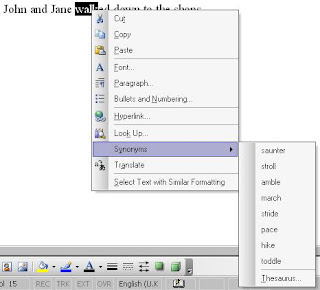However, most people just do not use enough of them! That is why Word's synonym feature is so incredibly useful, especially if like me you do a lot of creative writing or translation.
Why use the word "nice" (which should be banned anyway) in a composition, when you can use "pleasant", "good", "kind", "polite", "fine" or "lovely"? Or use "hot" when you can say, "burning", "scorching", "boiling", "blistering", "sizzling", "searing"?
You should have a synonyms dictionary or thesaurus close at hand when you are working, but Word's synonym feature makes it much quicker to substitute a different word to the one you were planning to use! And as far as I know this feature is available for other languages too, provided Word has a dictionary installed for that language.
It's easy to use - as you are typing, simply highlight the section of the word you want a synonym for (not necessary if you want the full word, but it doesn't work that well with past tenses etc.) and right-click.

 The resulting context menu has a Synonyms option and, navigating on, you will be presented with a sub-menu with a list of synonyms. Choose one and the word will be replaced with the synonym! Hey - as we like to say here so often - presto!
The resulting context menu has a Synonyms option and, navigating on, you will be presented with a sub-menu with a list of synonyms. Choose one and the word will be replaced with the synonym! Hey - as we like to say here so often - presto!
A few provisos:
1) the best use of this facility is when you already know the words that Word suggests, but just couldn't think of them! It is a great reminder, but I wouldn't recommend you simply use any word that sounds good - you could end up sounding stupid, and nobody wants that!
2) the Synonym does NOT appear on the context (right-click) menu in certain, well, contexts. For example, if there is a spelling or grammatical mistake, underlined in red or green, then it will first want to correct the mistake before showing the Synonyms sub-menu, which can be annoying if the mistake is not really a mistake, like an uncapitalised first letter which you WANT that way.
3) as mentioned earlier (in parentheses, now THAT is bad style!), forms other than the basic, infinitive or singular form of the word are not always handled that well. In particular, when you have a plural, say theories, it will suggest "theory" as the synonym, which is a bit strange. So you may at times need to type in the basic form of the word and then right-click it.
I use this synonyms feature a GREAT deal! It does not imply that Microsoft somehow has a better grasp of the English language than I do. Rather, this is a little bit of help in unlocking all those vast stores of passive language you have up there in your brain/mind/noggin/grey matter.


